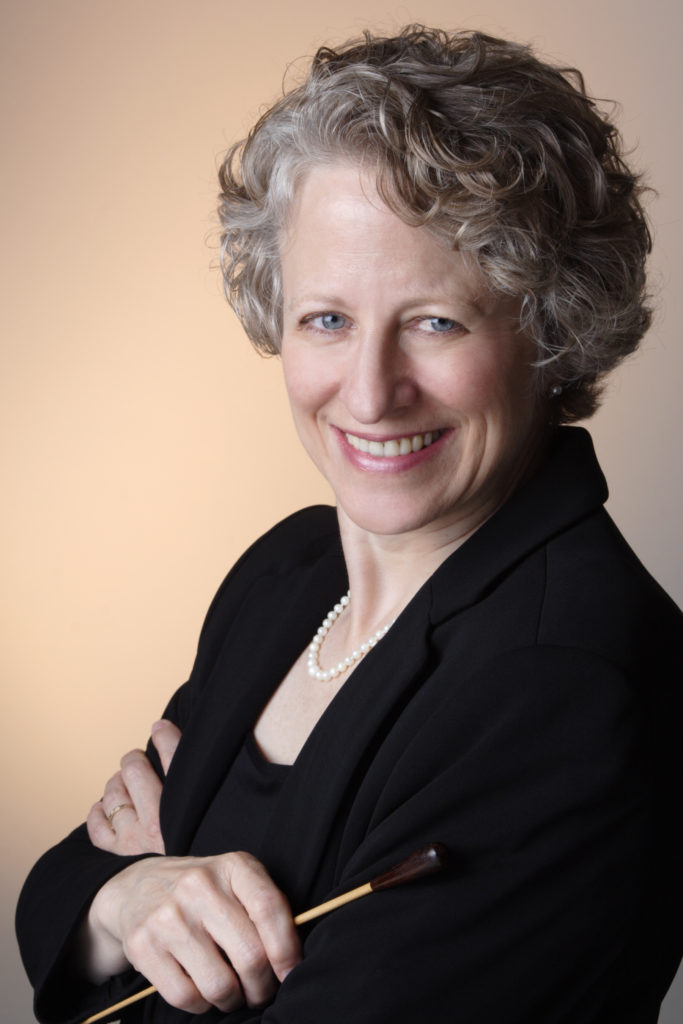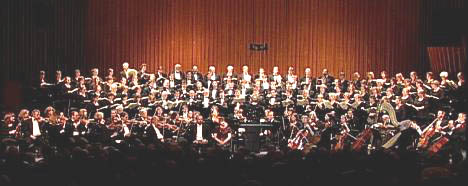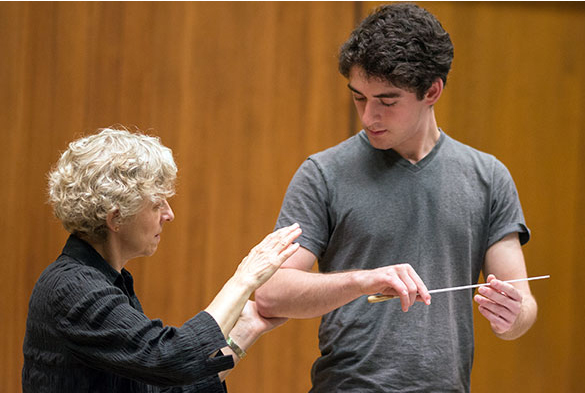 Conductor Melinda O’Neal has been praised for her “lucid and musical understanding of the score,” “moving and satisfying interpretations,” and her “stylish and clear manner on the podium” by Hugh Macdonald, Berlioz scholar and music critic. She is professor of music emerita at Dartmouth College, where she taught conducting and theory courses and conducted Handel Society and Chamber Singers, and she is artistic director & conductor emerita of Handel Choir of Baltimore.
Conductor Melinda O’Neal has been praised for her “lucid and musical understanding of the score,” “moving and satisfying interpretations,” and her “stylish and clear manner on the podium” by Hugh Macdonald, Berlioz scholar and music critic. She is professor of music emerita at Dartmouth College, where she taught conducting and theory courses and conducted Handel Society and Chamber Singers, and she is artistic director & conductor emerita of Handel Choir of Baltimore.
Under her leadership (2004-2013), Handel Choir of Baltimore became a community/professional oratorio ensemble performing baroque and classic style works with period instrument orchestras; it also joined colleague ensembles to perform music from the 19th century to the present. Collaborations included engagements with the Baltimore Chamber Orchestra, Baltimore Symphony Orchestra, Bach Sinfonia, American Opera Theatre, Pro Musica Rara, and Peabody Early Music. Works O’Neal conducted with Handel Choir and the Handel Period Instrument Orchestra include, for example, Mozart’s Requiem, Haydn’s Die Schöpfung, Theresienmesse and Paukenmesse, Handel’s Messiah, Jephtha, Semele and Ode to the Birthday of Queen Anne, Bach cantatas, and Purcell symphony anthems. The Baltimore Sun noted, “Melinda O’Neal has steadily and rapidly honed this ensemble into quite a potent chorus… It was a thoughtfully constructed, entertaining program delivered with an informed sense of historic style.”
Special projects in Baltimore included a performance of Handel’s oratorio Semele with Clara Rottsolk and Aaron Sheehan in leading roles (2012); “Anglo Meets Saxon” with music from Britten to Bruckner (2012); a staged presentation of Handel’s final oratorio Jephtha in collaboration with American Opera Theatre (2010), and the commissioning and première of Jonathan Leshnoff’s Requiem for the Fallen (2008) and Donald McCullough’s Song of the Shulamite (2013).
 From 1979-2004, O’Neal conducted the Handel Society of Dartmouth College, a student-community oratorio ensemble performing two-to-three choral-orchestral works annually with distinguished guest vocal artists and professional Hanover Chamber Orchestra. Under O’Neal’s 25-year leadership, repertoire included Berlioz’s Roméo et Juliette and L’enfance du Christ, John Adams’ Harmonium, Vaughan Williams’ Dona Nobis Pacem and Hodie, Verdi’s Requiem, Beethoven’s Missa solemnis, Haydn’s Harmoniemesse, Mendelssohn’s Elijah, and Bach’s St. Matthew Passion and St. John Passion, among others. O’Neal also conducted the all-undergraduate Chamber Singers (1979-1996), leading them on seven international tours. They presented numerous annual renaissance dinners entitled “Feast of Song,” and with them she started a series of concerts with period instruments.
From 1979-2004, O’Neal conducted the Handel Society of Dartmouth College, a student-community oratorio ensemble performing two-to-three choral-orchestral works annually with distinguished guest vocal artists and professional Hanover Chamber Orchestra. Under O’Neal’s 25-year leadership, repertoire included Berlioz’s Roméo et Juliette and L’enfance du Christ, John Adams’ Harmonium, Vaughan Williams’ Dona Nobis Pacem and Hodie, Verdi’s Requiem, Beethoven’s Missa solemnis, Haydn’s Harmoniemesse, Mendelssohn’s Elijah, and Bach’s St. Matthew Passion and St. John Passion, among others. O’Neal also conducted the all-undergraduate Chamber Singers (1979-1996), leading them on seven international tours. They presented numerous annual renaissance dinners entitled “Feast of Song,” and with them she started a series of concerts with period instruments.
 O’Neal designed and taught courses in conducting, text and music, and Berlioz, Brahms and the Romantic Imagination, and she was an advisor to numerous Dartmouth students working on honors theses, recitals, senior fellowships and presidential scholar projects. She initiated and directed the Music Department’s term-long study program in London, leading it four times, and served as chair and interim chair of the department. She was founder and director of the Dartmouth Conducting Institute, a workshop for ten selected professional conductors, teaching alongside guest faculty Jan Harrington and Thomas Dunn.
O’Neal designed and taught courses in conducting, text and music, and Berlioz, Brahms and the Romantic Imagination, and she was an advisor to numerous Dartmouth students working on honors theses, recitals, senior fellowships and presidential scholar projects. She initiated and directed the Music Department’s term-long study program in London, leading it four times, and served as chair and interim chair of the department. She was founder and director of the Dartmouth Conducting Institute, a workshop for ten selected professional conductors, teaching alongside guest faculty Jan Harrington and Thomas Dunn.
O’Neal has been a visiting professor at Indiana University, where she taught graduate choral literature courses for conductors, Towson University, and University of Georgia. She founded and conducted the New Hampshire Symphony Chorus, Groupe Vocale de St. Denis in Hanover, and Boston Vocal Artists’ Sonique. As guest conductor, O’Neal worked with Albany ProMusica, Baltimore Chamber Orchestra, Hanover Chamber Orchestra, Seattle Symphony Chorale, and the Vermont and New Hampshire Symphony Orchestras.
O’Neal holds masters and doctoral degrees in choral-orchestral conducting from Indiana University Jacobs School of Music and a bachelor of music education from Florida State University. She studied score preparation, choral literature, and conducting with Julius Herford, Jan Harrington, Fiora Contino, Helmuth Rilling, Robert Shaw, Marcel Couraud, John Nelson, and Thomas Dunn. She is a past member of Conductors Guild national board and currently serves on the research and publications committee of American Choral Directors Association as reviewer for the Julius Herford Prize.
Her research focuses on the music of Hector Berlioz, historical performance practices, relationship of text and music, and conducting pedagogy. Experiencing Berlioz: A Listener’s Companion (Rowman & Littlefield, 2018) represents a culmination of these interests. Her heartfelt thanks are extended to the many student, community and professional singers and instrumentalists who have performed Berlioz’s well-known and lesser-known works under her direction.
For more information, see https://music.dartmouth.edu/people/melinda-oneal and CV.